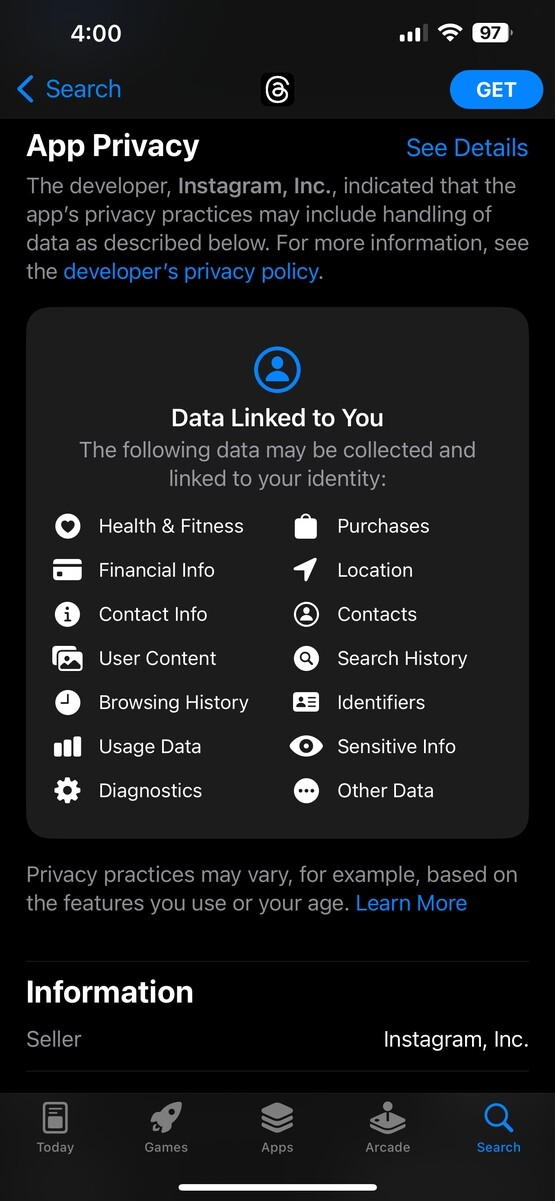I don’t understand what Meta will gain from participating in the fediverse? Their ultimate goal is to make money of Threads and I just don’t see how encouraging an open federation will help them do it? Even 3Eing the fediverse will not do them much good as they already have sooo much traffic already that killing the fediverse will not make a serious change in their figures. But OTOH it does seem like Threads is net positive for the fediverse ATM. Even if all current denizens of the fediverse will block Threads, there is a large group of people that are exposed to the concept of “fediverse” for the fist time and some of them will want to learn more. This is a good thing. Anyway, I don’t know why they are doing it, but I’m cautiously glad they did it. Thanks for coming to my Ted talk.
I think they’re trying to get people off Fedi and into Threads.
Yeah that’s a possibility. They could do something like “ohh too bad Killer Feature X is looking so badly on Mastodon. On Threads it will look so much better”. Essentially using fedi as a crappy demo for Threads. That sounds like a typical business plan to me.
Embrace, Extend, Extinguish. It’s the old Microsoft playbook that Google is trying to pull with Chrome.
I think people around here have a vastly overestimated opinion of how important the fediverse is to other social media sites.
Within the first 7 hours of Threads, they had 10 million users.
Meta absolutely DGAF about us. They don’t have to. Using ActivityPub is at worst an anti-monopoly play. But by the time they turn on federation, all of the people who were going to leave the fediverse for Threads will likely already have done so.
Meta wouldn’t have a plan to federate in the future if they didn’t have an end goal of taking advantage of the federation.
This is what people aren’t getting. The fediverse, as it is now, is irrelevant to Meta’s plans for Threads. Meta views the fediverse as an inducement to get creators to join Threads. Per The Verge:
As Mosseri puts it, this is a move designed to appease creators who have grown increasingly wary of relying on the whims of centralized social media companies. “I think we might be a more compelling platform for creators, particularly for the newer creators who are more and more savvy, if we are a place where you don’t have to feel like you have to trust us forever,” he says.
its like when AOL opened up its email and chat service to anyone though i expect with learnings on why that didn’t work.
I don’t know, aren’t most of the citizens of the fediverse here because we are abandoning the large, profit-driven social media companies? It seems like it’s more of an invasion than persuasion - they want access to what we have, and since the AP is open, they can get access to it (mostly Mastodon, but also the content we have on the wider fediverse as well).
@jcrabapple @ComptitiveSubset EEE. Embrace, extend and extinguish.
Lol not gonna work
“Mastodon is so hard to understand, at least Threads is easy.”
Once people start saying that Meta will be in charge of the fediverse.
If the fediverse wants to retain its independence from Meta, the content producers of significance need to be convinced of the value of being in control of their brand while still having access to the user base of Threads. If the content producers go to Threads, the fediverse becomes irrelevant.
The fediverse is and always will be more than microblogging instances like Threads and Mastodon.
Exactly. Ease of use can truly impact the growth of a platform.
Like, I’m sure most people on Lemmy are a bit tech savvy, but the overall user just want to make 1 account and be able to access everything.
Right now, Threads is doing a “good” job by integrating themselves with Instagram. Don’t even need to create a new account if you have Insta, just pop in and start using it.
I would bet 100 dollars they want in on the Fediverse because they want to extinguish a competitor. They did it with Instagram and Whatsapp. They’ll do it again.
The fediverse isn’t a competitor. It’s not even a blip on their radar for competition.
All 35 of us :d
My opinion is it’s just the data, Meta is all about collecting data. Being part of the fediverse means they potentially get access to a bunch of data through scraping and user interactions.
For example someone might not follow a gardening account on instagram/Facebook but they might join a gardening community. That’s valuable data.
They can also boast about the new technology. Maybe they hope it will revive the meta verse lol
They can already access the data, it’s all federated and it’s all publically available effectively by definition, they don’t need to launch a platform that interacts with Fedi in order to scrape it. And Meta will only be able to scrape user profiling data on the people accessing Fediverse through their own tools and platforms. In the large term, all data is useful and getting the additional facets of how their users interact with a twitter-like platform is good - but I don’t think that’s really why they chose to federate.
But…
What joining Fediverse does offer them is a way of launching their Twitter-rival product with genuine and organic content or activity already present.
Facebook & Instagram’s primary demographics are not internet pioneers, they don’t tend to build new things - they feed off existing activity and build on top of it. They access the platforms to consume content, and only move to creating or posting content over time as they develop networks on the sites. Meta cannot realistically launch a Twitter competitor whole-cloth. The sort of people who joined Twitter early to build that space aren’t joining a Meta product, likewise the people who join new platforms or normal fediverse.
If it launched empty, it would remain empty. People would check it out, see almost no content or no content they care about, and not come back. Meta can only realistically launch a product like Threads with activity already occurring, and things like AI content or fake profiles aren’t necessarily convincing enough to lure in the punters. But Fedi is preexisting and active and there’s already A Thing there that Meta can point their users at, there’s already content to consume and people to interact with.
My opinion is it’s just the data, Meta is all about collecting data. Being part of the fediverse means they potentially get access to a bunch of data through scraping and user interactions.
You’re absolutely right! Just take a look at the privacy of the Threads app. Even if you don’t have Threads app installed, they can figure out anyone from another fediverse server. That’s the reason fediverse servers should not federate with Meta servers.

They can scrape that data withiut federating. Anyone can, there’s a public API. And I suspect once they federate Threads, Mastodon will be a tiny share of the resulting fediverse.
No to say they won’t ingest all that data, of course, they’ll get their hands on everything they can, but I doubt it’s the primary motivation behind it.
That’s a very good point, I had forgotten that. Anomander has a good perspective on this too in a different reply
Being part of the fediverse means they potentially get access to a bunch of data through scraping and user interactions.
They can already scrape this data without even being part of a federated community though.
That’s a very good point. There’s always an agenda when it comes to these massive companies. The more data they have, the more predictions they can make, and the more accurate they’ll be. Understanding how people move through these communities is massive for Meta. The more you understand something, the better you know how to exploit it.
Their main goal is to kill twitter. Their second goal is to skirt antimonopoly laws when they succeed to kill twitter. Their third and optional goal is to starve twitter-like fediverse apps from users. They has loads of resource, if they can come with good and familiar ui without usual growing pains that fediverse has (server overloaded, client not ready), many non tech savy users will never look beyond threads. Thus robbing mastodon, calckey, pleroma, etc from potential users and attention.
While I agree overall, I definitely agree with that last sentence. As someone who originally joined the Fediverse for the first in March via Mastodon, I’ve since then spread out and tried the many other fedi products (is that even the right word to use?) and have since settled on a Misskey forked server called Foundkey for my “Twitter” experience. While I agree with others that Threads being part of the Fediverse is good, I also agree in that the familiarity with Meta/Facebook will make people not want to branch out and explore what else the Fediverse has to offer which in turn hurts everyone else.
Their third and optional goal is to starve twitter-like fediverse apps from users. […] Thus robbing mastodon, calckey, pleroma, etc from potential users and attention.
They can (will) do that without federating. Federating (or not) is not going to make any appreciable difference.
This is why I place it as third and optional goal. Few percent of people who knows fediverse doesn’t participate in it because not many instance is as reliable as big companies service. They may be willing to migrate to mastodon when the software is more matured, but now migrating to threads instead because of meta’s backing.
Don’t you think people will switch from threads to Mastodon? I think there are allot of people who would rather not have Meta’s app installed on their phone.
In western cultural hemisphere, yes. Antimeta and anti big-corporation backed social media has gained big momentum.
Meanwhile on global south, they didn’t even know what privacy is. And fediverse user on my country is less than 1000 from tens of millions people. In global-south at least, I saw potential to introduce fediverse to greater masses using thread.
I’ll summarize what the CEO of Instagram said in an interview on the Hardfork podcast this morning. Lots of hot takes here based on everyone’s rightful skepticism of Meta, but I think it’s worth understanding what their stated plan is.
First, the CEO said he thinks federation is the future, that social media in general is going to be increasingly moving that way in the next 5 years. This gives them a chance to take a big early swing in the space and get some learning in. Remeber, as much as a lot of fediverse people are worried about Threads joining, Threads is also worried about all of you who are already on the Fediverse. Part of what they are selling is a sane and we’ll moderated social platform that regular people can use, and federating is a challenge to their moderation. They are trying to work out how they can moderate content coming into the Threads server and shown to those users without having to defederate entire servers.
Second, and similar to number one, they expect that content creators, influencers, etc will come to expect account/follower portability as decentralization of social media becomes more widespread. This one is huge, and it’s one of their main selling points. They are telling celebrities that hey you can join Threads and it will be safe and sane, but if five years down the line you hate it, you can just pack up your account and move to another platform and keep all your followers. This is a really big deal, celebrities, influencers, journalists, etc spend years building followings and the main thing holding a lot back from jumping off Twitter for example is that when they go to a new platform they start with zero followers. Joining a platform where you are assured that you can jump ship without having to start at zero everytime is a huuuge selling point, and the reason they’ve been able to get celebrities on as early adopters.
Finally, the CEO said ads will probably come some day, but they are not focused on monetization at all right now, but just building a sustainable platform that is fun to use. They expect a lot of initial interest, and then for a bunch of users to get bored and leave, and then to work on slow growth overtime.
That’s straight from the horse’s mouth (via my memory). Was he being perfectly honest, probably not. For example, he said they made the decision to push Threads out now before it was fully EU complaint because EU compliance would take months and he was afraid they could miss their window of opportunity. He wouldn’t explicitly say Twitter has gone to shit and their going after that market, but that’s pretty clearly what he was alluding to. Also, keep in mind as a corporate representative all his statements can get the company in trouble for misleading shareholders (see Musks “going private at 420 a share” tweet for example), so he’s not able to outright lie about the company’s plans. So I’d take this all with a grain of salt, but I wouldn’t run immediately to conspiracy theories.
ads will probably come some day, but they are not focused on monetization at all right now
most sites do not start out shittified, they become ENshittified.
That is fair. I mostly just think its interesting that he was fairly upfront about it. Meta is a for profit business, so its not unexpected. I do think it will be interesting though because they seem pretty committed to account portability, and if they stick with that then that puts some pressure on them to maintain a good user experience. Even all the talk about embrace, extend, extinguish, all starts with the assumption that Threads will be so big it will make changes and force other instances to either comply or get defederated and the assumption is that users would flock to Threads from Mastadon rather than the other way around. Personally, I expect Meta’s move here is going to increase interest in Activitypub and more projects are going to be launched on it, both from startups and established big tech. I think its equally plausible that the better analogy is AOL opening up to the world wide web and HTML and getting swallowed in the process. There is a lot of fear about Threads, but I’m not convinced this is a doomsday scenario for the fediverse, I’m personally cautiously optimistic.
It’s nice to see a (cautiously) optimistic voice on this subject for a change, although I think I feel less optimistic than you. But I do think there’s the potential for it to be mutually beneficial so long as Meta remains non-malevolent.
I think there a few key differences that mean the Google XMPP situation can be used as a direct parallel, too. Google didn’t really see much benefit from staying federated, because all federation did with live messaging was mean that non-Google users were benefitting from Google’s users without being monetised by Google. When Google’s users lost access to their non-Google contacts, the vast majority of them just carried on as usual, meaning Google continued monetising them as usual and it was only beneficial for Google as a company.
I don’t think that’s the case with Threads. Meta will continue to benefit from federating with well-moderated content in the future because, for Meta, it’s content that’s being created for free by another platform that they can still monetise. And if it’s well-moderated content, that’s effectively free moderation, too - something Meta would normally have to employ people for.
More interest in Activity Pub from other big players would definitely be a good thing, if only to make sure no one company has a monopoly. It would potentially have disadvantages, of course, but I think if tech giants are going to get involved, I’d rather multiple get involved to keep things somewhat competitive and (hopefully) drive consumer-friendly ideas.
I appreciate your take and pretty much agree with everything you said. I’ve seen the XMPP example thrown around a lot, but the distinction you made with the benefit that Threads gets from federation compared with what Google got is spot on. I’d add that Threads is currently selling the account portability piece as a major draw for public figures warry of needing to rebuild followings on new platforms every couple of years when their current platform goes to shit. That is another benefit to keeping federation, theoretically anyway.
I really like that the fediverse is kind of in a utopian stage right now, people are volunteering to spin up servers and putting their time and energy into making them run smoothly for everyone, people are pitching in with donations, the community as a whole is full of positive early adopters excited about what this could be. Hard to predict where things go from here. Maybe Meta comes in and destroys everything like some fear. Maybe tech firms come and compete and push the small non-profits and volunteers out, and the fediverse just becomes competing big tech platforms. Maybe the tech firms and volunteers/non-profits can kind of coexist, something like the FOSS community where you have some bigger firms making money (Redhat/Canonical) working with volunteers and foundations. Even if things stayed volunteer driven, there is also the risk that an individual instance could get so big that it starts demanding changes from other instances to continue federation or throwing up targeted ads. I think with the Twitter and Reddit fiascos, Tik Tok has begun the enshitification process, we’re entering a new post-centeralized social media world, but what that world ultimately looks like I don’t know.
I’m cautiously optimistic for two reasons: 1) Threads is bringing more general attention to Activitypub, which is positive in general but especially with Meta making a big bet with their money and what’s left of their reputation, and 2) Threads is here, its impractical to think the existing fediverse community is going to erect a giant wallaround them, so I might as well hope for the best cause this shit is happening.
They are probably also hoping that it will give them the necessary good will with EU competition regulators that are already trying to break Meta’s market dominance on social media and communication.
It’s interesting that they’re worried about moderation. It wouldn’t seem like too hard of a thing for a $100 billion company to just hire some some folks to take care of that.
I think its more how do they deal with moderation while federating. When you have a closed system, you can control everything. But when you have users on Threads reading posts from Mastadon.Social or some random smaller instances, how do you effectively filter the stuff coming into your server that your users will interact with. I don’t know enough how that all works, but the CEO seemed to characterize it as a technical problem they were working to solve.
By being the first major social network to adopt activityhub, it means they have an advantage when/if activityhub takes off.
Little nitpick, just to help people find it if they’re curious — it’s called ActivityPub.
They participate because the Digital Markets Act is forcing them to: https://commission.europa.eu/strategy-and-policy/priorities-2019-2024/europe-fit-digital-age/digital-markets-act-ensuring-fair-and-open-digital-markets_en
Examples of the “do’s” - Gatekeeper platforms will have to:
- allow third parties to inter-operate with the gatekeeper’s own services in certain specific situations
- allow their business users to access the data that they generate in their use of the gatekeeper’s platform
- provide companies advertising on their platform with the tools and information necessary for advertisers and publishers to carry out their own independent verification of their advertisements hosted by the gatekeeper
- allow their business users to promote their offer and conclude contracts with their customers outside the gatekeeper’s platform
The interoperability is the big one. The Fediverse gives a way for Meta to be in compliance, and they have an interest in maintaining competition.
I don’t know what their intentions are in full, but they certainly won’t be good from our perspective. We came here to free ourselves from corporate shackles, not bind ourselves back up in them.
Coercion seems to be a big part of the enshittification process these days. Even once you complete stage 3 and piss everyone off, forcing them to stay against their will is part of the game.
This would force a lot of unwilling people to deal with Facebook, and long-term.
My own hypothesis is that it’s not as much about EEE in the way that people understand it, or about stealing the small amount of users on the fediverse, but more about hedging against the possibility that the fediverse gains significant mainstream appeal. By having one foot in the fediverse they can better capture the fedi-curious. I don’t think the fediverse is currently a threat, but the possibility that it could be I think is what they care about. And spinning up Threads is a cheap (for them) way to address that.
Yes, people are panicking because Meta is coming for us. They’re taking two opportunities with one strike:
- fill the void that Twitter is starting to create
- profit from the buzz around the fediverse
At the end of the day, more people in the fediverse is a win in my book. And if it becomes a problem there’s always defederation as a last resort.
Embrace, extend, extinguish
They can do that without federating. In the first 7 hours of Threads being open, they got 10 million users. There’s nothing additional they can do to “extinguish” the fediverse simply by being inside it.
Any fediverse users who prefer Threads are going to go there anyway - remember, you have to create a new account on each server already! And anyone who detests Meta is going to stay in the fediverse regardless. They’re here now, when the fediverse is minuscule. Nothing Meta can do is going to make the fediverse smaller.
They can flood the fediverse with mediocre content, ads via posts, and use both to scrape replies to create even more data about users. They can do this through existing instances In theory, but it would be far easier to federated and subscribe to instances to pull in the data to their own instance and being easier means it is more likely.
Making the fediverse bigger to harvest more data is a net loss for the fediverse.
Squash the fediverse before it reaches critical mass.
That’s not how the fediverse works though. Google and Facebook were the two biggest sites online, but even then they still couldn’t “squash” the world wide web, the most successful federated service.
They’re trying to “embrace, extend, extinguish.” Federated social media is an existential threat to them, so they’re trying to absorb it before it has the chance to gain momentum.
Enshitifying anything and everything online
E.A.A.E.O.
I can hear Serj from System of a Down singing this.
Same here. Gotta listen to them again
Wake up!
Rolls right off the tongue
There are probably several reasons, many not entirely clear to any one of us now, but one can guess.
I think not an insignificant reason for this is the coming expansion of the EU Digital Markets Act where Meta among a few other tech giants are labeled as gatekeepers. As always, while the EU might be one of the earlier ones, other markets will likely follow in the coming decade.
Meta will going forward be forced to open up their platforms and incorporate interoperability with other services. It starts with messages, but knowing the EU, that is probably just the first stepping stone.
If Meta have to do it anyways, they will probably want to make sure that they are the first one in establish a strong presence in the technology that every other tech giant will also need to embrace.
I don’t think they care even a little about the present Fediverse community, what they do care about is the technology that Apple, Microsoft, Google, TikTok and so on will agree on to use going forward. By embracing ActivityPub early, they are betting on having already a strong position when these companies are inevitably going to have to try to agree on a common standard.
If I had to guess, I would say that they want to scrape the data and use it for ad revenue. Not 100% sure but that would be my guess.
Definitely a good guess
They can already do it by running a simple web scraper or running an anonymous instance that federates with everyone in disguise
but unless they are federated we won’t see the ads that they are going to disguise as legitimate user content.
On their app that should be harder to skip because the timeline is based on their algorithm and ads should be unavoidable, but how the hell would they force a user on another platform to see it? And how would they even directly target this person with a specific ad? If what people on instances federated with Threads see on their federated timeline are regular posts from business accounts placed in chronological order, I’m guessing there’d be no problem just blocking those “profiles” and moving on
They can’t. People are simply fearful due to ignorance. No one knows anything at this point, so all this Threads fear mongering feels like a psyop to weaken the fediverse and bottleneck all content that is being submitted to it.
Yeah, for now I’m skeptical because they’re Meta and they have to find ways to monetize this service, but on one day they’ve already overshadowed the rest of the fediverse easily. Even if they can’t profit as effectively off other instances, their instance is already ridiculously big and profitable regardless; the scraping thing really sounds like fear mongering. So if the only downside of federating with Threads is that my federated timeline would get cluttered with business accounts posting ads, I’d be alright with it, as long as I can get more content on my Home timeline from LOTS of people I want to follow who are not willing to interface with Mastodon, Pleroma, etc. Unless they force regular user accounts to publish advertisements to people outside the Threads instance, I’ll take it
Federating their own instance(s) would make it far easier than scraping.
I can write a Mastodon scraper in a few minutes, make it scalable in a few days. Definitely easier than implementing ActivityPub in an app.
Honestly I somewhat agree with this. I get the fear about Meta hurting the Fediverse by federating with it and then acting maliciously (XMPP), but I actually think it’s an “I’m not trapped in here with you…” type of situation. I would point to the example of AOL giving its users access to Usenet / the WWW – their hand was forced a little bit if they wanted to stay relevant, but I actually could see an argument that the community network was so compelling, and so outside the control of AOL if someone else wanted to compete with them on it, that that increased awareness of the world outside AOL was just one more factor that contributed to their downfall. They went from being their own wildly successful content provider to a captive audience, to being a bargain-basement ISP no different than thousands of others, to being irrelevant.
IDK what I would do if I were Meta, sitting on this aging flagship platform and trying to stay relevant with a clear and compelling exit door available for my users. Also, clearly I don’t have a multi-billion dollar company to argue for my own qualifications, but that said, I think what I would do in that situation is:
- Put serious effort and attention into making FB / Instagram / Whatsapp / etc a useful and rewarding platform for people to interact with each other
- Try to come up with genuinely compelling functionality and apps that are a reason for people to be on their platforms instead of somewhere else
What I wouldn’t do is:
- Change my name to Meta and hope no one ties “Meta” to “Facebook” mentally when they’re writing off Facebook as a obsolete and boomer-ized platform
- Do anything to help build awareness of the Fediverse in my user base
- Keep my actual platform 90% the same (notably the central place advertising has in dictating operations)
Edit: I am wrong (at least as far as the AOL parts). I was confusing AOL with some of the other walled-garden networks that granted their users web access as the web took off, but it was a web provider from the very beginning in addition to having its own little AOL services. Usenet access came later, but even that was pretty early in their history, well before their downfall. My analysis sounds compelling maybe but I think it’s 100% wrong now that I’ve looked a little more into AOL’s history. I looks to me now like they mostly got destroyed by broadband replacing dialup and being unable to pivot away from their dialup-centric roots.































